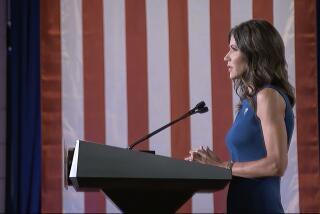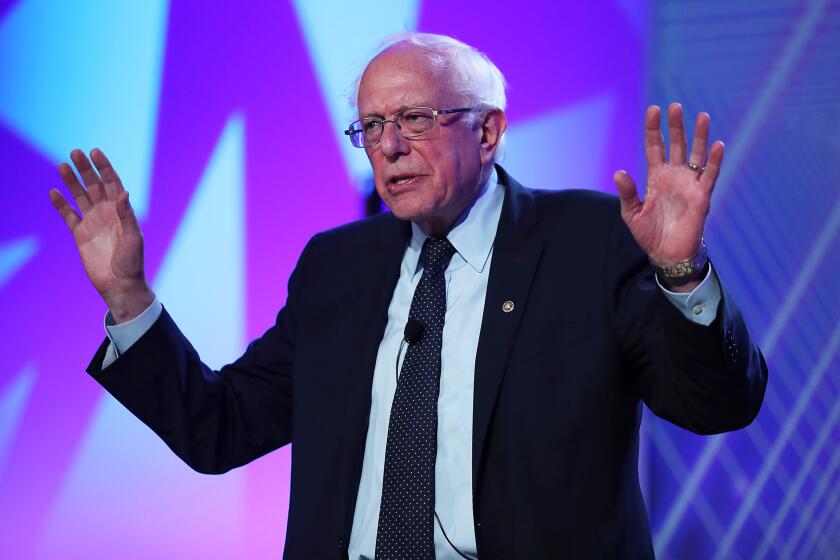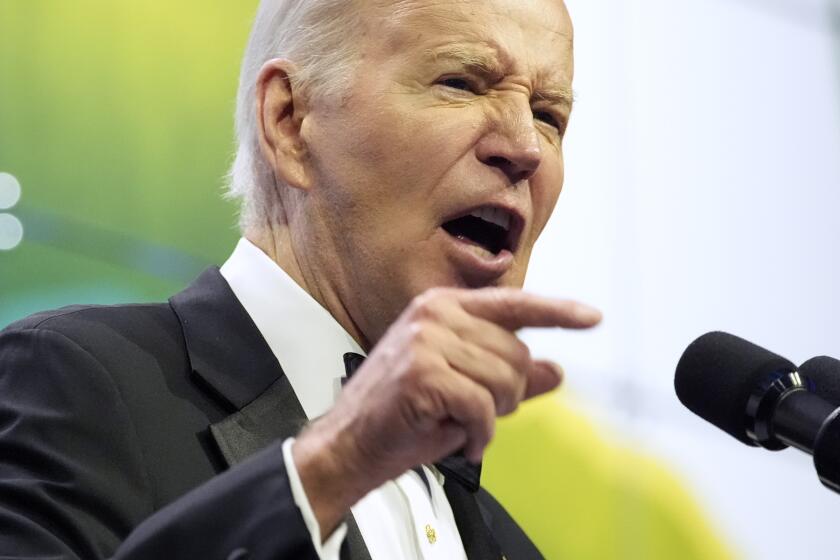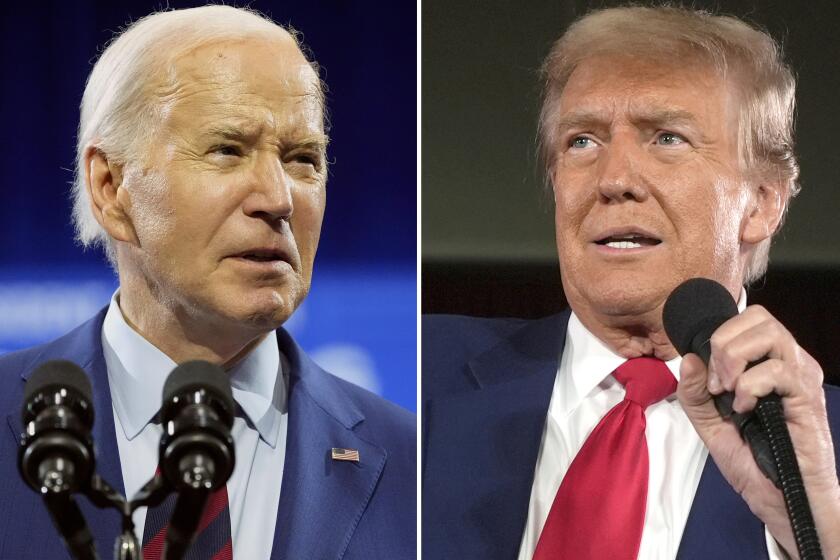Soaring Deficit Lurks in Wings for New Governor
It’s the issue neither gubernatorial candidate wants to talk much about, but it is likely to dominate the new governor’s first months in office: a growing state budget deficit that is soaring past $1 billion and could go considerably higher.
State fiscal experts say California’s dreary financial situation is getting worse every day and threatens to overwhelm some of the campaign pledges advanced by both Democrat Dianne Feinstein and Republican Pete Wilson.
With the economy lagging, state revenues have fallen $138 million short of forecast levels for the first three months of this fiscal year, the legislative analyst’s office reported this week. A business recession would give state government a double whammy--a decline in tax receipts and an increase in welfare and other costs that increase in bad economic times.
Even before that report, the analyst’s office had estimated that the new governor’s first budget would be out of balance by nearly $1 billion.
The deficit would grow even larger if the California economy continues to weaken and if voters approve any of a number of Nov. 6 ballot measures that would tie up future tax revenue and require additional spending on new programs. Some Sacramento sources say the prospective deficit for next year already is approaching an estimated $2 billion.
Having a balanced budget by July 1--the first for the new governor--would require either major cuts in spending, higher taxes or a combination of both.
Wilson and Feinstein have talked about convening sessions immediately after the election to begin grappling with the potential deficit. Both have proposed general budget reforms that would free them of some of the restrictions written into state law and the Constitution over the last three decades. As a result of these restrictions, at least 85% of the state budget--more than 90%, Gov. George Deukmejian contends--is funneled into specific programs beyond the control of the Legislature and governor.
But Thomas J. Dooley, the chief deputy legislative analyst, said that any hope of achieving far-reaching reforms by the start of the next fiscal year is illusory at best.
Feinstein and Wilson have been reluctant to address the state’s fiscal problems in detail because that could involve talking about new taxes. Political experts say both may want to avoid the tangled trap of endorsing tax increases, which has doomed many a candidacy.
Wilson has refused to rule out a tax increase, but has opposed any change in state income tax rates.
Feinstein said she would avoid higher taxes until all other budget savings have been tried. Then, she said, she would favor restoration of the 11% bracket for those earning $200,000 a year or more. The top bracket is now 9.3%. Feinstein has argued that tax reforms of recent years unfairly favored the wealthiest Californians.
Steven A. Merksamer, who headed Deukmejian’s transition team in 1982, said the new chief executive must be prepared to move on the budget crisis immediately if there is any hope of correcting the flaws in the system that are pushing spending up faster than the tax revenues can rise to pay for it.
Merksamer, who was Deukmejian’s first chief of staff, said in an interview that the structural problems that underlie the deficit go back almost 30 years, and that resolving them could occupy as much as 90% of the chief executive’s time in the early months of the new administration.
“It’s going to be a massive undertaking,” Merksamer said. “How the governor handles it in the first four months will set the course for (the administration) for the next four years. It did for George Deukmejian.”
But Merksamer said the fiscal situation facing Wilson or Feinstein will be even worse than the one that greeted Deukmejian. With a freeze on all spending, the state took two years to grow out of the $1.5-billion deficit that Deukmejian inherited.
That no longer is possible, Merksamer said, because spending has been cut to the core since 1983 and billions of dollars in additional expenditures have been earmarked by voter initiatives in subsequent elections. This would give the new governor and Legislature even less latitude to target scarce fiscal resources to the state’s most pressing priorities.
Experts say a recent initiative with the broadest effect on the budget was Proposition 98, a 1988 measure that requires about 42% of the state’s General Fund go to public schools. Of the roughly $47 billion needed in 1991-92 to maintain present programs at existing levels, nearly $19 billion would be guaranteed for public schools.
Feinstein has pledged to uphold Proposition 98. Wilson has said that all state spending, including that for education, should be on the table when he attempts to negotiate a solution to the budget crisis.
In 1982, Deukmejian first learned of the magnitude of the impending budget shortfall in briefings conducted for both campaigns several months before the election, Merksamer said. Deukmejian announced his appointment of a chief of staff and finance director the day after the election, allowing them to get to work immediately on the budget.
But neither the Feinstein nor Wilson campaign has asked the Finance Department for a budget briefing, a state Finance Department official said.
Deukmejian and the Democratic-controlled Legislature fought bitterly this year over the current budget. Deukmejian failed to repeal state laws that grant automatic cost-of-living adjustments in certain entitlement programs like welfare. The final agreement, reached a full month after the constitutional budget deadline, provided for a one-year spending freeze and the imposition of a “trigger” device in future budget years that would roll back spending if revenues fell below a certain level.
The state Finance Department advised state agencies this week that the “trigger” will take effect in the 1991-92 fiscal year, prompting automatic budget cuts of up to 4%.
Budget experts say the resolution of the summer’s big budget battle did little but postpone the coming fiscal crisis.
There are major uncertainties other than the economy, including a lawsuit that, if lost, could force the state to pay $600 million more each year to support county health programs. That is the result of a dispute over an often-ignored statute requiring the state to pay for new duties that the Legislature imposes on counties.
Wilson has promised to veto any program mandated on local government by the Legislature that does not include state money to finance it. On Tuesday, Feinstein told the California League of Cities that the state should give cities and counties a new source of revenue to help them become more fiscally independent of the state.
Voters could add millions more to the looming deficit by the ballots they cast on Nov. 6. Passage of Proposition 134, for example, the so-called nickel-a-drink alcohol tax, would cost the state $181 million more than it would bring in during the present fiscal year and more than $300 million in 1991-92, Dooley said.
The Legislature already is at work on its own budget reforms, according to Assemblyman Phillip Isenberg (D-Sacramento). The Joint Legislative Budget Committee was ordered to report by Jan. 1 on a plan for reorganizing the state and local fiscal structure, including creation of a constitutional revision commission. The resolution declares that the ability of the Legislature and governor to budget wisely “has been seriously impaired by a number of court decisions, federal mandates, initiative constitutional amendments and statutes.”
Isenberg said the governor and Legislature will have to overcome a sour political mood left by a bitter election campaign. “None of this is very possible without some reaching out by a new governor to the Legislature,” he said in an interview this week.
Isenberg was not optimistic that the state budget problem will be straightened out soon. “I think it will take us 20 years to untangle what has taken 25 years to get into,” he said. “I don’t know how we’ll do it.”
The Deukmejian Administration is putting together a basic 1991-92 budget, holding state departments and agencies to no increases over current spending levels. The governor-elect will have about seven weeks to refashion the spending plan before its submission to the Legislature Jan. 10.
More to Read
Get the L.A. Times Politics newsletter
Deeply reported insights into legislation, politics and policy from Sacramento, Washington and beyond. In your inbox three times per week.
You may occasionally receive promotional content from the Los Angeles Times.






